a personal archive for anything i might need regarding art, writing, or life
Don't wanna be here? Send us removal request.
Text
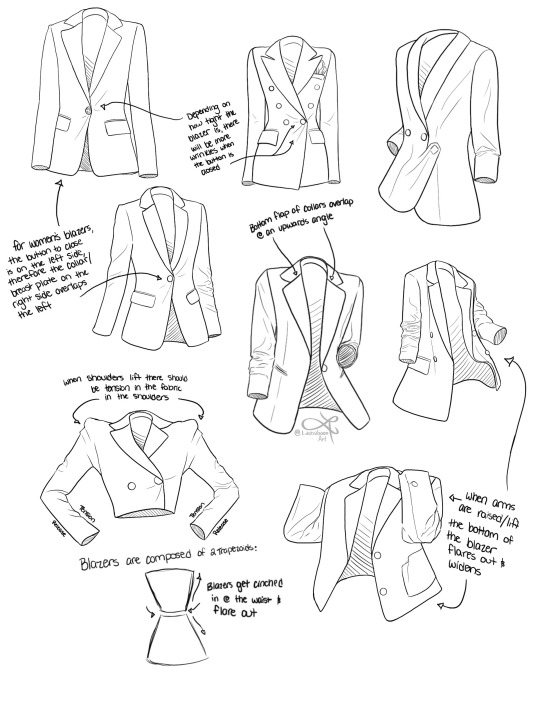
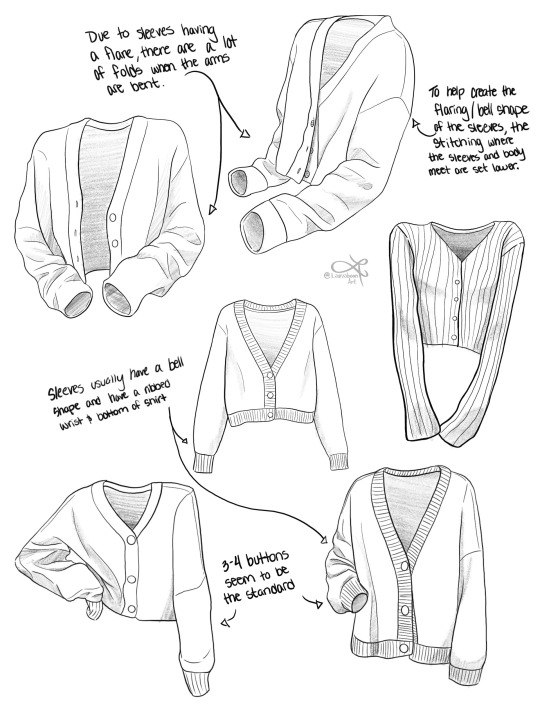
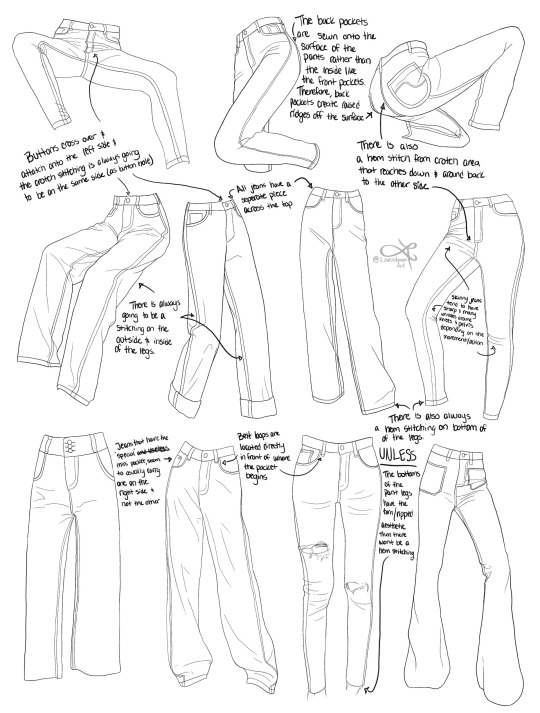
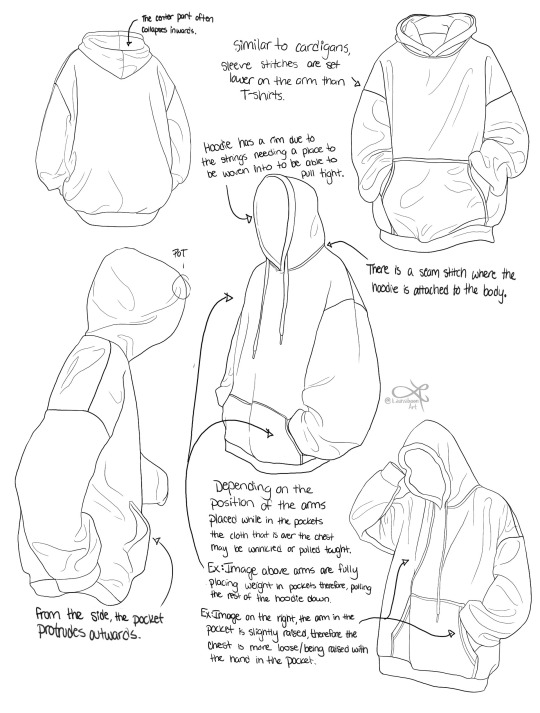

I'm currently doing an online art school program and I thought I'd share some notes on clothing pieces for anyone else whose like me and for some reason can't understand objects with free from lol I hope you find some of these observations/ notes useful for any of your art journeys!
21K notes
·
View notes
Text
Just a bunch of Useful websites - Updated for 2023
Removed/checked all links to make sure everything is working (03/03/23). Hope they help!
Sejda - Free online PDF editor.
Supercook - Have ingredients but no idea what to make? Put them in here and it’ll give you recipe ideas.
Still Tasty - Trying the above but unsure about whether that sauce in the fridge is still edible? Check here first.
Archive.ph - Paywall bypass. Like 12ft below but appears to work far better and across more sites in my testing. I’d recommend trying this one first as I had more success with it.
12ft – Hate paywalls? Try this site out.
Where Is This - Want to know where a picture was taken, this site can help.
TOS/DR - Terms of service, didn’t read. Gives you a summary of terms of service plus gives each site a privacy rating.
OneLook - Reverse dictionary for when you know the description of the word but can’t for the life of you remember the actual word.
My Abandonware - Brilliant site for free, legal games. Has games from 1978 up to present day across pc and console. You’ll be surprised by some of the games on there, some absolute gems.
Project Gutenberg – Always ends up on these type of lists and for very good reason. All works that are copyright free in one place.
Ninite – New PC? Install all of your programs in one go with no bloat or unnecessary crap.
PatchMyPC - Alternative to ninite with over 300 app options to keep upto date. Free for home users.
Unchecky – Tired of software trying to install additional unwanted programs? This will stop it completely by unchecking the necessary boxes when you install.
Sci-Hub – Research papers galore! Check here before shelling out money. And if it’s not here, try the next link in our list.
LibGen – Lots of free PDFs relate primarily to the sciences.
Zotero – A free and easy to use program to collect, organize, cite and share research.
Car Complaints – Buying a used car? Check out what other owners of the same model have to say about it first.
CamelCamelCamel – Check the historical prices of items on Amazon and set alerts for when prices drop.
Have I Been Pawned – Still the king when it comes to checking if your online accounts have been released in a data breach. Also able to sign up for email alerts if you’ve ever a victim of a breach.
I Have No TV - A collection of documentaries for you to while away the time. Completely free.
Radio Garden – Think Google Earth but wherever you zoom, you get the radio station of that place.
Just The Recipe – Paste in the url and get just the recipe as a result. No life story or adverts.
Tineye – An Amazing reverse image search tool.
My 90s TV – Simulates 90’s TV using YouTube videos. Also has My80sTV, My70sTV, My60sTV and for the younger ones out there, My00sTV. Lose yourself in nostalgia.
Foto Forensics – Free image analysis tools.
Old Games Download – A repository of games from the 90’s and early 2000’s. Get your fix of nostalgia here.
Online OCR – Convert pictures of text into actual text and output it in the format you need.
Remove Background – An amazingly quick and accurate way to remove backgrounds from your pictures.
Twoseven – Allows you to sync videos from providers such as Netflix, Youtube, Disney+ etc and watch them with your friends. Ad free and also has the ability to do real time video and text chat.
Terms of Service, Didn’t Read – Get a quick summary of Terms of service plus a privacy rating.
Coolors – Struggling to get a good combination of colors? This site will generate color palettes for you.
This To That – Need to glue two things together? This’ll help.
Photopea – A free online alternative to Adobe Photoshop. Does everything in your browser.
BitWarden – Free open source password manager.
Just Beam It - Peer to peer file transfer. Drop the file in on one end, click create link and send to whoever. Leave your pc on that page while they download. Because of how it works there are no file limits. It’s genuinely amazing. Best file transfer system I have ever used.
Atlas Obscura – Travelling to a new place? Find out the hidden treasures you should go to with Atlas Obscura.
ID Ransomware – Ever get ransomware on your computer? Use this to see if the virus infecting your pc has been cracked yet or not. Potentially saving you money. You can also sign up for email notifications if your particular problem hasn’t been cracked yet.
Way Back Machine – The Internet Archive is a non-profit library of millions of free books, movies, software, music, websites and loads more.
Rome2Rio – Directions from anywhere to anywhere by bus, train, plane, car and ferry.
Splitter – Seperate different audio tracks audio. Allowing you to split out music from the words for example.
myNoise – Gives you beautiful noises to match your mood. Increase your productivity, calm down and need help sleeping? All here for you.
DeepL – Best language translation tool on the web.
Forvo – Alternatively, if you need to hear a local speaking a word, this is the site for you.
For even more useful sites, there is an expanded list that can be found here.
81K notes
·
View notes
Note
so I've noticed that you and the tutorials you recommend for darning use an embroidery hoop. which frankly I've never heard of. I've only ever seen darning done with one of those wooden "eggs" and I'm curious as to why an embroidery hoop over the more traditional method? or is the egg only for socks?
Interesting question! Let's take a look at darning and darning tools.
Darning eggs or embroidery hoops?
What is darning:
Darning is a sewing technique used to repair holes or worn areas in fabric, using a needle and thread.
Woven fabric consists threads crisscrossing each other. These threads are called a warp and a weft: the warp threads are the vertical base of the fabric, while the weft threads are the threads that are drawn through these warp threads during the weaving process.
When we're darning woven fabrics, we first create new warp threads across our hole, then weave new weft threads through them.
(There's also Swiss darning which is a technique used on knits, but let's leave that for another day.)

(Image source) [ID: a diagram of woven fabric, showing the vertical warp threads and horizontal weft threads.]

(Image source) [ID: Vintage instructions on how to darn a hole.]
Darning tools:
Darning is a whole lot easier when the fabric you're trying to repair is pulled taut, similar to how weaving is usually done on a loom. This helps to keep the tension on your fabric even, avoiding loose or uneven stitching.
Both darning mushrooms/eggs and embroidery hoops can be used to pull your fabric taut.
For example, if you're fixing something that's difficult to handle (e.g. small cylinders like socks or gloves), you can employ a darning egg to pull the fabric taut while darning so you don't need to put your hand inside of your garment. Situations like these won't work with a hoop because those cylindrical items are too small for most hoops.

(Image source) [ID: seven different darning egg sizes and types: chicken, small goose, large goose, classic handle, curved handle, mushroom, and mini.]

(Image source) [ID: a red sock with a hole in it in progress of being darned with blue thread over a wooden darning egg.]
If you're fixing up bigger holes, or holes in fabric of which you can easily reach the back, an embroidery hoop might be more convenient depending on your personal habits.

(Image source) [ID: a piece of denim fabric in progress of being darned with the use of an embroidery hoop and yellow, orange, and red thread.]
You could also use something else to pull your fabric over, like a jam jar, a light bulb, or a tennis ball. I personally don't own a darning egg, so I tend to use glass bottles when darning items that can't be put into an embroidery hoop.
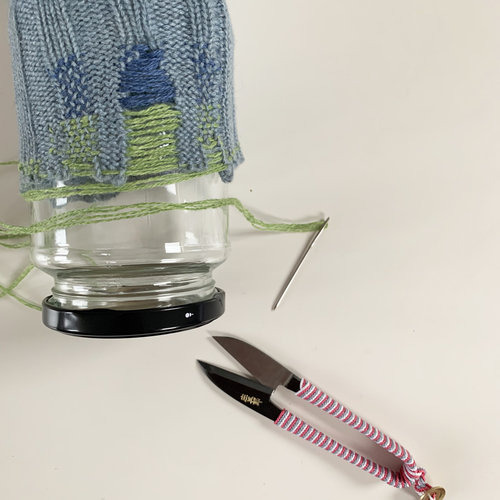
(Image source) [ID: a gray knit sleeve in progress of being darned with blue and green thread. The sleeve is pulled over an empty jam jar.]
Conclusion:
You can use both a darning egg/mushroom and an embroidery hoop to darn your clothes. Which one to choose depends on your personal preferences and the type and size of garment you're trying to mend.
EDIT: someone commented not to use light bulbs as they may shatter and hurt you, which is a good point. The ones I've got around aren't made from glass, but I didn't consider that might not be the case for all types of bulbs.
5K notes
·
View notes
Text


For drawing references
[@/ALEXbutalsoK on Twitter]
53K notes
·
View notes
Video
tumblr
after eight years, I finally updated my huge Historical Fashion Reference & Resources Doc! Now in the form of a MUCH more easily updated Google Doc with better organization, refreshed links, and five more pages of books and online resources.
I know tumblr hates links, but it’s worth it for a doc that I can now update with far more regularity going forward! RIP to the original, you did your duty for far longer than you should have. 😔🙏🏼
30K notes
·
View notes
Photo




The Mike Mignola guide to graveyards - from the November 1997 edition of Wizard Magazine
5K notes
·
View notes
Text
Skip Google for Research
As Google has worked to overtake the internet, its search algorithm has not just gotten worse. It has been designed to prioritize advertisers and popular pages often times excluding pages and content that better matches your search terms
As a writer in need of information for my stories, I find this unacceptable. As a proponent of availability of information so the populace can actually educate itself, it is unforgivable.
Below is a concise list of useful research sites compiled by Edward Clark over on Facebook. I was familiar with some, but not all of these.
⁂
Google is so powerful that it “hides” other search systems from us. We just don’t know the existence of most of them. Meanwhile, there are still a huge number of excellent searchers in the world who specialize in books, science, other smart information. Keep a list of sites you never heard of.
www.refseek.com - Academic Resource Search. More than a billion sources: encyclopedia, monographies, magazines.
www.worldcat.org - a search for the contents of 20 thousand worldwide libraries. Find out where lies the nearest rare book you need.
https://link.springer.com - access to more than 10 million scientific documents: books, articles, research protocols.
www.bioline.org.br is a library of scientific bioscience journals published in developing countries.
http://repec.org - volunteers from 102 countries have collected almost 4 million publications on economics and related science.
www.science.gov is an American state search engine on 2200+ scientific sites. More than 200 million articles are indexed.
www.pdfdrive.com is the largest website for free download of books in PDF format. Claiming over 225 million names.
www.base-search.net is one of the most powerful researches on academic studies texts. More than 100 million scientific documents, 70% of them are free
301K notes
·
View notes
Text
fucked up how colors look different depending on what screen you’re looking at them on. that should be illegal I think
208K notes
·
View notes
Text

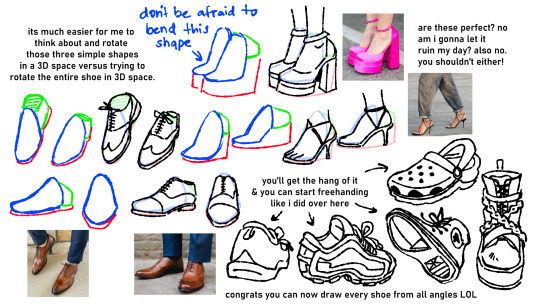
somepony asked how i draw shoes & here is my thought process :)
31K notes
·
View notes
Text
actually THIS is the only good tiktok
129K notes
·
View notes
Text
HEY THIS IS IMPORTANT whats your favorite place to find drawing references?
214K notes
·
View notes
Note
I know you probably get these asks a lot, but I've really been trying to try drawing comic pages. I really admire how free and flowing your style is! I've seen your little tutorials and tips and idk what's wrong but I just can't seem to wrap my head around panel composition? Like I do wonderful painting comps, but I can't seem to break out. Do you have any resources or help to get started?
thank you very much!!!!! im just using this ask as an excuse to draw random comic tips i hope thats okay and that you’ll get something out of it


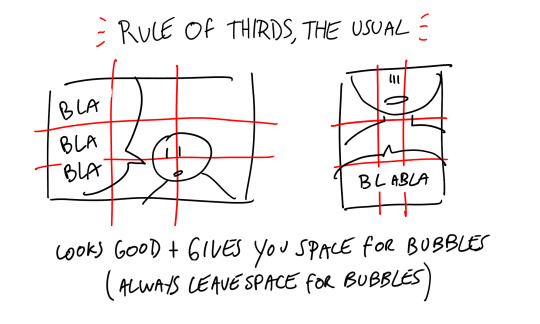


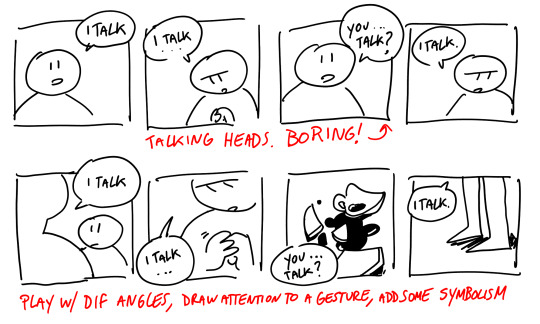
did that help…
37K notes
·
View notes
Text
You know what’s some crazy $hit?
This fabulous bitch

She makes a shit ton of poses (like 16,000 or some crazy nonsense). I used this lovely lady to draw so much as a teen. Whether it was some nerdy pose for my Mary Sue as fuck OCs

or for full on fight sequences

or for tragic deaths of my OCs in the arms of a totally OOC main protagonist.
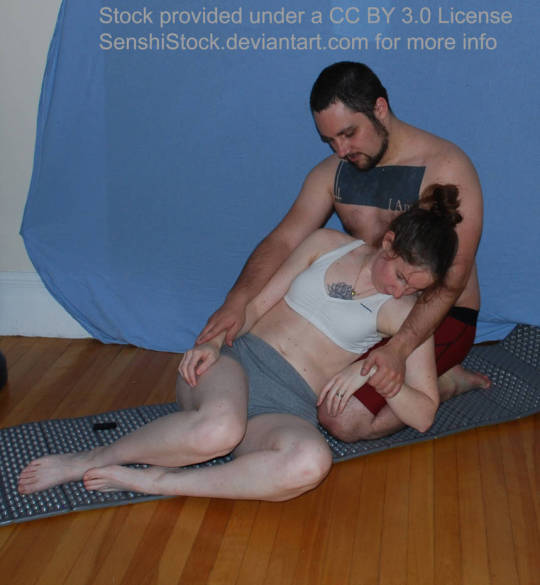
this bitch hooked me up.
And with the wildest, craziest stuff that you could see in your head but had no way or resources to reasonably draw like

or this

or this

DUDE! INASNE SHIT!! So I was using her for a pose reference and decided, you know what, I owe this bitch some cash. Lemme dole it out for her. BUT then, I looked and saw she only has 286 fucking patrons!! This chick gives out free shit and spends countless hours arranging these shoots and setting this stuff up.
I’ll fork up the cash, SenshiStock. You’re worth it.
Check out this amazing woman’s stuff, and get knowledged: https://www.deviantart.com/senshistock
232K notes
·
View notes
Text
apartment stuff from howtogrowthefuckup
not all of it, but stuff i find particularly useful/want to remember. RIP this blog. the gimmick wears off after a while but it was genuinely useful information.
BUDGETING
suggested monthly budget for groceries for a two-person household is $553. estimated weekly budget is around $100.
find a pad of paper and a pen and keep it with you for the next 24 hours. Write down every single fucking thing you use or even touch in your house. Tomorrow I want you to look at that list and figure out the cost of everything.
keep track of how much you spend on gas monthly.
add in your estimated utilities. You can fucking google that on your own, because it’s going to be different for wherever you want to live. Absolutely do this if you plan on moving to a different town or state.
divide your total monthly income by three. Hey, look at that, it’s my good friend Math again. Funny how he keeps showing up. Make sure the number of your expenses is less than the other 2/3rds, if it is, you can continue.
FINDING APARTMENTS
apartments.com
Focus on your top 10. Then your top 5. Then your top 3. Don’t go any farther than that (and don’t get rid of the research for the other 7 just yet). Create crazy complicated rating systems. Make an excel sheet or start putting stuff on your wall and connecting them with strings. Go full-on serial killer. Dedicate yourself.
You should also make note of how big the room is so you know if you can even fit what little you own. The same goes for the hallways or stairs or whatever exists outside the apartment on the way from your car. Could you get your mattress through all that shit?
PACKING
Figure out what you want to donate and what you want to put in the trash before you start packing.
Do not go grocery shopping right before moving... Just wait til you’re in the new place to make that trip.
Change your address. Like a week before you move. While you’re doing this, make a list of everywhere you’ve entered your address and need to change. Keep that list. Your future self will thank you someday.
Start in one room and pack all that before moving to a different part of the house. This is a good way to keep all your stuff together and it’s also a good way to find out that you own five decks of cards or one too many furbys.
Put everything into piles: keep, donate, and ditch.
Label the boxes with what room they belong to so you know exactly where it needs to go. Some people like to also mark this with a color coded sticker.
Also label what’s in the boxes. For example: Kitchen - silverware; cooking utensils; hot pads; magnet collection. You don’t need to label every item individually, but have some idea of what’s in there. Label it on more than one side. Don’t label it on the top, because you’ll just end up stacking boxes on top of each other.
Distribute the weight of your stuff. Mix heavy books with stuffed animals.
Alternately, pack by weight. Heavy stuff goes in small boxes, light stuff goes in big boxes. Basically what I’m saying is don’t pack a massive box with too much weight that it’s too heavy to carry or will break the box.
Use all of your suitcases and bags for packing!
For toiletries - take off the top, place plastic wrap over the opening, replace the top. This way you don’t end up with lotion all over your towels or something.
Know what you’ll need immediately and make sure those boxes are the last thing on the truck, first thing unloaded at the new place. Maybe keep those things in a clear container so you can see exactly what’s in there. Hint: three of the things you’ll need immediately are your toolbox, cleaning supplies, and toilet paper.
note to self: get toolbox and first aid kit.
Take pictures of the new apartment. Before anything goes in it. This way if there are any scratches on the wall or stains on the carpet, the new landlord can’t say it happened during the move.
ASKING QUESTIONS
Apartments.com and My First Apartment both have lists of questions to ask.
questions directly from the blog:
Is the apartment available and is it still listed at the same price or are they trying to swindle you/are they completely incompetent at updating their listings?
Will it be ready when you need it? It’s gonna totally suck if you find the right place and find out it’s not available when you’re ready to move
Are there appliances? Are they included? Do they even work?
How old is the apartment? This is important to ask because it will tell you how much trouble you’re going to have. Like, if it’s Civil War era, you might have issues with foundation cracks or old wiring or ghosts of soldiers waking you up in the middle of the night.
Have there been any issues with insects, rodents, mold, or mildew? You have to ask this. No good self-respecting property manager would tell you this of their own free will.
What kind of security is there? Did you have to go through a gate when you came in? Do you need a key to get into your building before you get into your door? Or does your door face out cheap motel style? Are there electronic pass codes? Is there any kind of security force on site?
If you ever find someone willing to hang out with you, is there a special place they need to park? Do you need to let the office know if they plan on staying the night?
Where do you park? Is parking included? Is in indoor or outdoor?
Do you need a city sticker to park on the street? [Note: I asked this when I moved to Missouri and everyone thought I was batshit crazy. This is normal in places like Chicago, not so normal elsewhere. See if you can determine that before you ask a crazy question.]
Can you paint the walls? Can you put holes in the walls? Can you do whatever it is you do to walls, so long as they look the same when you move out?
What exactly is the maintenance policy, beyond walls? What is covered, what’s not? And who do you contact when there’s an issue? Is there a maintenance person on staff, or do they call out to someone in the area? Do they have a 24-hour emergency maintenance line
Is there heat and air conditioning? What kind? If it’s a window unit, will it be included in the apartment? Are the costs of heating and cooling included
Do you have control over the temperature or is it a building thing?Are any utilities included?
Who are the cable and internet providers in the area? What are their rates? Does the apartment complex have an exclusive contract with one of the companies?
What kind of people live here? Do they have children? Are they all ancient? Do they have, as I suspect my last neighbors did, a bowling alley in their apartment?
Just how much are you going to hear from your neighbors? On a scale of Ernest Hemingway to Les Mis, how thick are the walls?
When is rent due and how do they want it? Are checks required? Can you pay with a credit card? Do they want it all in cash? Also, how is rent submitted? Can you pay electronically or do you drop it in a mailbox?
Do you need renter’s insurance? About how much does it cost? Are there any weird things that need to be included that might not be everywhere? Like, are earthquakes an issue?
What is the process for applying to the apartment, should you choose to rent it? Are there credit checks?
What’s the pet policy? Is there pet rent?
Are there quiet hours or other weird rules about volume or people or places or things?
Are there public areas like pools or parks or gyms? What are the rules regarding those?
If you have a roommate, will both of your names be on the lease, or will one person be designated as the responsible party (you better pray it isn’t you)?
What about trash? Is there pick up or dumpsters? Recycling?
Is there a storage unit included? Where is it? What kind of security does it have?
What happens with deliveries? Do they all go through the front office or are they left on your doorstep? Are you able to pick stuff up at any time? Do you need certain ID for it?
Is there a dishwasher? Is it louder than the bowling alley next door?
If you’re in an area that gets snow, do they plow or shovel? Will they totally bury your car if you don’t move it when the plow comes by?Is there public transportation anywhere?
not questions, but things to pay attention to:
Where are the outlets? Take note of prongs.
Are there permanent light sources or do you need to go to Ikea?
How big are the rooms? What shape are they? Are you going to be able to fit all your shit in here? [Note: you should already have a floor plan online, but ask for a paper copy if they have one.]
Do the people in the office seem at all competent? Are they going to make your life a living hell?
Can you get your stuff up/down the stairs or through the doors when you move in?
Are the appliances/apartment gas or electric?
Bathtub or shower?
Can you open the oven and fridge and still walk through the room? Will opening any doors block off other areas or hit something else?
Can you get a cell signal in the apartment? Seriously.
EDIT: waybackmachine links:
1 • 2 • 3 • 4
53 notes
·
View notes
Note
NOTE TO SELF AND TO OTHERS:
the “howtogrowthefuckup” blog has been deleted. a number of the posts can be found using the wayback machine.
I want to live by myself when I move out of my parent's place but I'm really afraid of money problems? I'm afraid that the only place I can afford will be in the ghetto and it'll all be torn apart and I'll only be allowed to eat one granola bar a week. I'm really stressing out about this. I don't know anything about after school life. I don't know anything about paying bills or how to buy an apartment and it's really scaring me. is there anything you know that can help me?
HI darling,
I’ve actually got a super wonderful masterpost for you to check out:
Home
what the hell is a mortgage?
first apartment essentials checklist
how to care for cacti and succulents
the care and keeping of plants
Getting an apartment
Money
earn rewards by taking polls
how to coupon
what to do when you can’t pay your bills
see if you’re paying too much for your cell phone bill
how to save money
How to Balance a Check Book
How to do Your Own Taxes
Health
how to take care of yourself when you’re sick
things to bring to a doctor’s appointment
how to get free therapy
what to expect from your first gynecologist appointment
how to make a doctor’s appointment
how to pick a health insurance plan
how to avoid a hangover
a list of stress relievers
how to remove a splinter
Emergency
what to do if you get pulled over by a cop
a list of hotlines in a crisis
things to keep in your car in case of an emergency
how to do the heimlich maneuver
Job
time management
create a resume
find the right career
how to pick a major
how to avoid a hangover
how to interview for a job
how to stop procrastinating
How to write cover letters
Travel
ULTIMATE PACKING LIST
Traveling for Cheap
Travel Accessories
The Best Way to Pack a Suitcase
How To Read A Map
How to Apply For A Passport
How to Make A Travel Budget
Better You
read the news
leave your childhood traumas behind
how to quit smoking
how to knit
how to stop biting your nails
how to stop procrastinating
how to stop skipping breakfast
how to stop micromanaging
how to stop avoiding asking for help
how to stop swearing constantly
how to stop being a pushover
learn another language
how to improve your self-esteem
how to sew
learn how to embroider
how to love yourself
100 tips for life
Apartments/Houses/Moving
Moving Out and Getting an Apartment, Part 1: Are You Sure? (The Responsible One)
Moving Out and Getting an Apartment, Part 2: Finding the Damn Apartment (The Responsible One)
Moving Out and Getting an Apartment, Part 3: Questions to Ask about the Damn Apartment (The Responsible One)
Moving Out and Getting an Apartment, Part 4: Packing and Moving All of Your Shit (The Responsible One)
How to Protect Your Home Against Break-Ins (The Responsible One)
Education
How to Find a Fucking College (The Sudden Adult)
How to Find Some Fucking Money for College (The Sudden Adult)
What to Do When You Can’t Afford Your #1 Post-Secondary School (The Sudden Adult)
Stop Shitting on Community College Kids (Why Community College is Fucking Awesome) (The Responsible One)
How to Ask for a Recommendation Letter (The Responsible One)
How to Choose a College Major (The Sudden Adult)
Finances
How to Write a Goddamn Check (The Responsible One)
How to Convince Credit Companies You’re Not a Worthless Bag of Shit (The Responsible One)
Debit vs Credit (The Responsible One)
What to Do if Your Wallet is Stolen/Lost (The Sudden Adult)
Budgeting 101 (The Responsible One)
Important Tax Links to Know (The Responsible One)
How to Choose a Bank Without Screwing Yourself (The Responsible One)
Job Hunting
How to Write a Resume Like a Boss (The Responsible One)
How to Write a Cover Letter Someone Will Actually Read (The Responsible One)
How to Handle a Phone Interview without Fucking Up (The Responsible One)
10 Sites to Start Your Job Search (The Responsible One)
Life Skills
Staying in Touch with Friends/Family (The Sudden Adult)
Bar Etiquette (The Sudden Adult)
What to Do After a Car Accident (The Sudden Adult)
Grow Up and Buy Your Own Groceries (The Responsible One)
How to Survive Plane Trips (The Sudden Adult)
How to Make a List of Goals (The Responsible One)
How to Stop Whining and Make a Damn Appointment (The Responsible One)
Miscellaneous
What to Expect from the Hell that is Jury Duty (The Responsible One)
Relationships
Marriage: What the Fuck Does It Mean and How the Hell Do I Know When I’m Ready? (Guest post - The Northwest Adult)
How Fucked Are You for Moving In with Your Significant Other: An Interview with an Actual Real-Life Couple Living Together™ (mintypineapple and catastrofries)
Travel & Vehicles
How to Winterize Your Piece of Shit Vehicle (The Responsible One)
How to Make Public Transportation Your Bitch (The Responsible One)
Other Blog Features
Apps for Asshats
Harsh Truths & Bitter Reminders
Asks I’ll Probably Need to Refer People to Later
Apartments (or Life Skills) - How Not to Live in Filth (The Sudden Adult)
Finances - Tax Basics (The Responsible One)
Important Documents - How to Get a Copy of Your Birth Certificate (The Responsible One)
Important Documents - How to Get a Replacement ID (The Responsible One)
Health - How to Deal with a Chemical Burn (The Responsible One)
Job Hunting - List of Jobs Based on Social Interaction Levels (The Sudden Adult)
Job Hunting - How to Avoid Falling into a Pit of Despair While Job Hunting (The Responsible One)
Job Hunting - Questions to Ask in an Interview (The Responsible One)
Life Skills - First-Time Flying Tips (The Sudden Adult)
Life Skills - How to Ask a Good Question (The Responsible One)
Life Skills - Reasons to Take a Foreign Language (The Responsible One)
Life Skills - Opening a Bar Tab (The Sudden Adult)
Relationships - Long Distance Relationships: How to Stay in Contact (The Responsible One)
Adult Cheat Sheet:
what to do if your pet gets lost
removing stains from your carpet
how to know if you’re eligible for food stamps
throwing a dinner party
i’m pregnant, now what?
first aid tools to keep in your house
how to keep a clean kitchen
learning how to become independent from your parents
job interview tips
opening your first bank account
what to do if you lose your wallet
tips for cheap furniture
easy ways to cut your spending
selecting the right tires for your car
taking out your first loan
picking out the right credit card
how to get out of parking tickets
how to fix a leaky faucet
get all of your news in one place
getting rid of mice & rats in your house
when to go to the e.r.
buying your first home
how to buy your first stocks
guide to brewing coffee
first apartment essentials checklist
coping with a job you hate
30 books to read before you’re 30
what’s the deal with retirement?
difference between insurances
Once you’ve looked over all those cool links, I have some general advice for you on how you can have some sort of support system going for you:
Reasons to move out of home
You may decide to leave home for many different reasons, including:
wishing to live independently
location difficulties – for example, the need to move closer to university
conflict with your parents
being asked to leave by your parents.
Issues to consider when moving out of home
It’s common to be a little unsure when you make a decision like leaving home. You may choose to move, but find that you face problems you didn’t anticipate, such as:
Unreadiness – you may find you are not quite ready to handle all the responsibilities.
Money worries – bills including rent, utilities like gas and electricity and the cost of groceries may catch you by surprise, especially if you are used to your parents providing for everything. Debt may become an issue.
Flatmate problems – issues such as paying bills on time, sharing housework equally, friends who never pay board, but stay anyway, and lifestyle incompatibilities (such as a non-drug-user flatting with a drug user) may result in hostilities and arguments.
Your parents may be worried
Think about how your parents may be feeling and talk with them if they are worried about you. Most parents want their children to be happy and independent, but they might be concerned about a lot of different things. For example:
They may worry that you are not ready.
They may be sad because they will miss you.
They may think you shouldn’t leave home until you are married or have bought a house.
They may be concerned about the people you have chosen to live with.
Reassure your parents that you will keep in touch and visit regularly. Try to leave on a positive note. Hopefully, they are happy about your plans and support your decision.
Tips for a successful move
Tips include:
Don’t make a rash decision – consider the situation carefully. Are you ready to live independently? Do you make enough money to support yourself? Are you moving out for the right reasons?
Draw up a realistic budget – don’t forget to include ‘hidden’ expenses such as the property’s security deposit or bond (usually four weeks’ rent), connection fees for utilities, and home and contents insurance.
Communicate – avoid misunderstandings, hostilities and arguments by talking openly and respectfully about your concerns with flatmates and parents. Make sure you’re open to their point of view too – getting along is a two-way street.
Keep in touch – talk to your parents about regular home visits: for example, having Sunday night dinner together every week.
Work out acceptable behaviour – if your parents don’t like your flatmate(s), find out why. It is usually the behaviour rather than the person that causes offence (for example, swearing or smoking). Out of respect for your parents, ask your flatmate(s) to be on their best behaviour when your parents visit and do the same for them.
Ask for help – if things are becoming difficult, don’t be too proud to ask your parents for help. They have a lot of life experience.
If your family home does not provide support
Not everyone who leaves home can return home or ask their parents for help in times of trouble. If you have been thrown out of home or left home to escape abuse or conflict, you may be too young or unprepared to cope.
If you are a fostered child, you will have to leave the state-care system when you turn 18, but you may not be ready to make the sudden transition to independence.
If you need support, help is available from a range of community and government organisations. Assistance includes emergency accommodation and food vouchers. If you can’t call your parents or foster parents, call one of the associations below for information, advice and assistance.
Where to get help
Your doctor
Kids Helpline Tel. 1800 55 1800
Lifeline Tel. 13 11 44
Home Ground Services Tel. 1800 048 325
Relationships Australia Tel. 1300 364 277
Centrelink Crisis or Special Help Tel. 13 28 50
Tenants Union of Victoria Tel. (03) 9416 2577
Things to remember
Try to solve any problems before you leave home. Don’t leave because of a fight or other family difficulty if you can possibly avoid it.
Draw up a realistic budget that includes ‘hidden’ expenses, such as bond, connection fees for utilities, and home and contents insurance.
Remember that you can get help from a range of community and government organizations.
(source)
Keep me updated? xx
153K notes
·
View notes
Text
Visible Mending
Introduction:
Visible mending is a decorative way to fix up an item. Instead of trying to make your mend as invisible as possible, the idea is to make it part of the garment's design.
Visual mending is not a single technique: it's more of a mindset. If you've got an item you love, it deserves to be mended, and if you're going to put that love into stitches, why not show them off?
That being said, there are some specific techniques that are popular with visible menders. Let's take a look!
Sashiko:
Sashiko is a type of traditional Japanese embroidery that is used to both decorate and reinforce fabric. In visible mending, sashiko is often used to cover up holes with patches or to reinforce thinning fabric. This technique uses a variation on the running stitch.

(Image source)
Some resources on sashiko:
SashiCo on YouTube: sashiko livestreams and information on the cultural aspect of sashiko.
Written tutorial by Upcycle Stitches.
Free sashiko templates by TheSpruceCrafts.
Fixing jeans with sashiko by Soluna Collective.

(Image source)

(Image source)
Embroidery:
Regular embroidery is also a popular technique to accentuate your mends. Check out my embroidery 101 post to learn how to get started. You can embroider patches, or use embroidery to hide or accentuate any stitches you've made to fix holes. Embroidery's also a great way to cover up stains.

(Image source)

(Image source)
Patches:
There are many ways to add patches to a garment. My tutorial on patches is a good place to start if you want to make custom-shaped patches to sew on top of your fabric. You can also sew your patch on the inside of your garment and have it peek out from beneath the hole you're trying to fix. Fun ideas for this are lace or superheroes.

(Image source)

(Source)
Darning:
Darning is a technique used to repair holes in fabric by using running stitches to weave extra fabric over the hole as to fill it up again. While traditionally darning is done in an invisible way by using the same colour of thread as your fabric, you can also use contrasting colours to accentuate your fix. Check out this written tutorial on darning by TheSpruceCrafts.

(Image source)
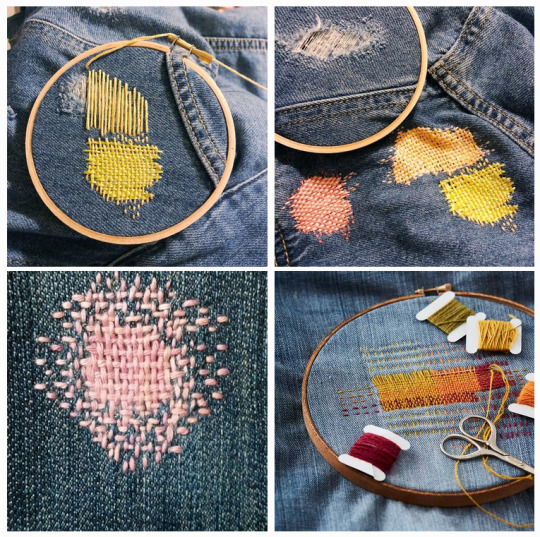
(Image source)
Conclusion:
Visible mending is a creative way to fix up your clothes and give them some personality at the same time.
You should be proud of the fact that you took the time and learned the necessary skills needed to mend your clothes! Show off what you did!
A fun side effect of wearing these obvious mends is that people will notice them. They'll remember your fixes the next time they're faced with a hole in their wardrobe, and it will make them more likely to try it for themselves.
These are just a few ways to visibly mend your garments. Want more inspiration? Check out Pinterest or r/Visiblemending on Reddit.
100K notes
·
View notes
